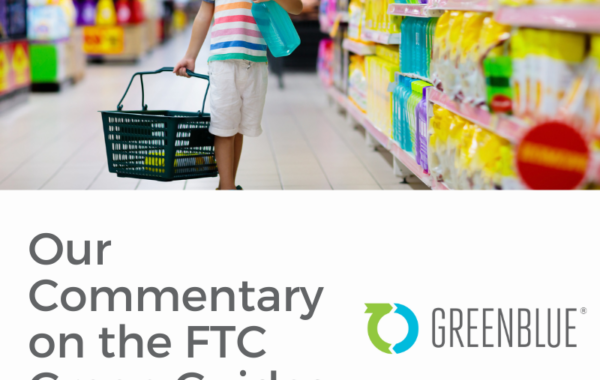May 20, 2020
Unsurprisingly, large items, such as plastic bottles and plastic bags are at the forefront of legislation. Single-use plastic bans, extended producer responsibility (EPR), post-consumer recycled (PCR) content minimums, and mandatory recycling policies are popular tactics used in the legislative arena to curb the environmental impact of plastic packaging. But last week SPC’s Virtual Packaging Chat explored a less obvious application of plastics: labels, tags, fasteners, external embellishments, and graphics. Our How2Recycle Project Manager, Caroline Cox, spoke with Sarah Sanzo, Product Compliance & Sustainability Manager at Avery Dennison about their sustainability goals, plastic packaging legislation, NGO’s, and the relationship between the three.
Sustainability is a Journey
Sanzo described sustainability at Avery Dennison as a journey. Since announcing their sustainability goals in 2015, Avery Dennison has pledged to improve many key areas in packaging including reducing landfilling, repurposing waste, and sourcing certified paper. They are on track to meet or exceed their 2025 goals inclusive of their entire value chain due to the collaboration with strategic partners both regionally and abroad. On a global scale, many factors can affect sustainability, but Sanzo reported one prevalent consistency – the goals do not change; the strategies may shift or conversations might alter depending on the location, but the goals stand firm for the entire company.
Legislation is Key
Plastic packaging legislation takes a multitude of forms and occurs at varying levels (like state and federal) making a patchwork of legislation for companies to navigate. Sanzo remarked on a surge in legislation at the state and national level in the United States and to expect the same trend moving forward. For example, California introduced a bill (later vetoed) mandating 50% recycled content in beverage bottles by 2030. Secondly, Vermont’s universal recycling law was updated in 2019 to include a single-use product ban preventing the distribution of plastic items like bags, straws, stirrers, and styrofoam. Lastly, the Canadian province, Ontario, adopted EPR legislation last summer to officially transition in 2023. Sanzo commented that with legislation like these at varying levels, it is important to leverage NGO partnerships to gain perspective.
NGOs are Strategic Partners
Nationally and globally scaled partnerships with NGOs can help companies achieve their sustainability goals by acting as a conduit for driving change. For example, the Association of Plastic Recyclers Demand Champions program, has its members voluntarily commit to growing the use of post-consumer resins by finding new, innovative applications. Demand Champions work toward driving demand, increasing supply, continuing investment, and expanding the market for mixed residential plastics. As a supplier, Avery Dennison can influence its brands and retailers to increase post-consumer resins in products; using its NGO partners to demonstrate strength in demand. Another NGO partnership is Avery Dennison’s membership with the Ellen MacArthur’s Circular Economy 100 (CE100) Network. This partnership fosters collaboration and knowledge sharing with events, shared resources, and projects on the circular economy strategy. Beyond the Demand Champion program and the CE100 Network, Sanzo noted few other NGO partnerships including the World Wildlife Fund and How2Recycle®, a project of GreenBlue.
Avery Dennison has demonstrated that a company’s sustainability journey can utilize a variety of strategies to achieve their goals. Robust partnerships with NGOs move their journey along and provide support from their peers. The patchwork of legislation at a state and federal levels influence actions and can help pave the road ahead. Neither legislation or NGO partnerships alone will curb the environmental impact of plastic packaging, both are needed to create positive environmental change. Sustainability goals, NGO partnerships, and legislation are the trifecta for forging ahead on the sustainability journey.





